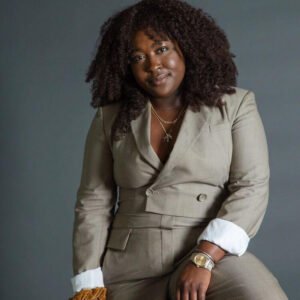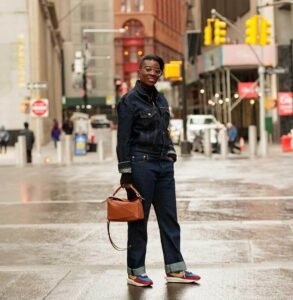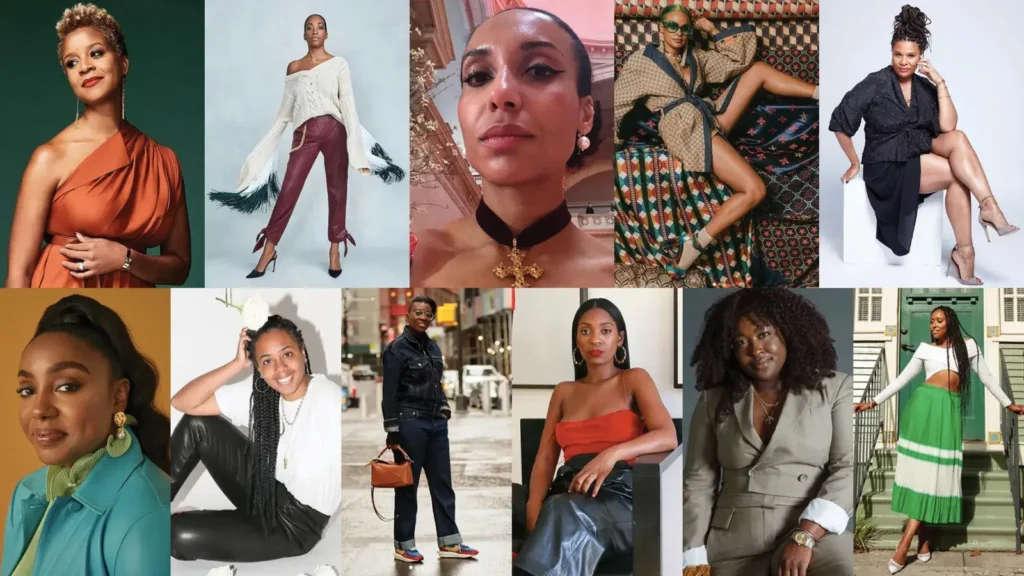Like many other immigrant families, my strict Haitian parents longed for the day when they could send me off to study either law or medicine at university. I forced an interest in the medical field to make my parents proud. Although she did not work in the industry, my mother was the first Black woman who introduced me to the world of fashion and the art of getting dressed. To this day, I vividly remember her getting ready for a party while I sat in her room and studied the way she styled her black diamanté wrap dress with a pair of black open-toe heels, and a clutch so sparkly that it hurt to look directly at it. And although she did not understand my desire to work in the fashion industry, she taught me persistence and resilience and is the reason I believed in my ability to succeed in any career.
Even still, I ignored my mounting interest in the fashion industry because, at the time, I only knew of a handful of Black people who worked in the industry, and they were all men. I was young and impressionable so I allowed the lack of representation of Black women in the fashion industry to diminish any belief that I could successfully be a part of an industry that seemingly did not accept women who looked like me.
It wasn’t until I discovered some of the Black women who held coveted positions in fashion that I started to truly see a future for myself in the industry. Like any young girl in high school, I was obsessed with all things Teen Vogue, and when I happened across an article on Fashion Bomb Daily spotlighting Shiona Turini, who was the accessories director of Teen Vogue at the time, my entire outlook of the industry changed. The fashion space held little regard for Black women, both in their offices and in their glossy issues, so it was critical to see someone who looked like me be in a position of power in a career I dreamed of being a part of. I made a promise to myself to not let anything or anyone get in the way of my aspirations to “make it” in the fashion industry. To make sure I kept this promise with myself, I made a vision board with the Vogue masthead on it as a reminder of what I wanted to accomplish for myself. That vision board still hangs in my childhood room, and I am still in disbelief that I made my 16-year-old dreams come true.
I have so much gratitude for the Black women who paved the way for me. I will never forget the night when Rajni Jacques—the fashion director at Teen Vogue at the time—stopped by my desk on her way out and took the time to see how I was acclimating to my new position as the fashion market assistant at Vogue. In that brief exchange, Rajni empowered me by speaking to her own experiences as a Haitian woman breaking into the fashion industry. That conversation helped put my purpose in perspective and restored the certainty that I belonged and deserved to be in the position that I was in.
The last two weeks have been increasingly trying as conversations within the Black fashion community are being amplified due to the lack of representation and support for Black creatives. These conversations are overdue and coincide with the global pandemic and worldwide protests advocating against the racial injustices of the Black community. So naturally, I have been searching for ways to stay inspired and find joy regardless of the circumstances. And as I scroll through social media, read, and watch the news, I am constantly made aware of Black pain but never of Black joy. To combat the encompassing feeling of hopelessness, I seek solace in using this time to reconnect with my parents and learn more about my Haitian heritage. It has been comforting to speak to other Black women on how they are finding joy for both guidance and inspiration. Below, I spoke with 11 Black women in the fashion industry who have made a major impact in my life and career on what is bringing them joy during this time as well as the organizations they are supporting.
Rajni Jacques, Fashion Director, Allure
It’s been hard trying to find delight in the world with everything that’s happening. But you can always go deeper and find meaning in the lousy and the awful. With COVID, it’s about seeing what you do have over what you don’t have. Super simple things like a bed, food, family who aren’t sick, and even silence to regroup. With the needed and meaningful uproar of all the racial tensions, I’ve begun to teach my three-year-old son who he is, his history, how people will view him, and how to hold his head up high and be proud of being Black—how he should be proud of being from such rich heritage. I’ve also been finding joy in having time to paint more. I’m creating pieces that reflect what’s happening now as well as works that I’ve sketched out but never had the time or discipline to execute. I’m also finding bliss in organizing with friends. We are starting Building Black Bedstuy (to launch shortly), to help find new ways to give back to the dwindling Black businesses in the community.
The cause I believe in, because I am a Black woman who is raising another Black woman, is Black Women’s Health Imperative. Why? Because health equity for Black women and girls is abysmal in America. The health system is failing us at alarming rates, especially when it comes to Black pregnant women—no matter the economic status.
Chioma Nnadi, Fashion News Director, Vogue.com

For me finding joy in this moment has been tied to sisterhood and connecting with the other inspiring Black women in my life. I recently watched Mahogany with a group of friends over Zoom, and just feeling that sense of togetherness while Diana Ross is twirling onscreen—talk about Black joy!—was one of the most uplifting moments of the past few weeks. I’ve really been cherishing that kinship more than ever. With that in mind, I’d like to spread the word for the #QuietAsWereKept fund supporting black and WOC freelancers.
Sandrine Charles, Founder of Sandrine Charles Consulting

These past couple of weeks have been a reminder of things Black people have experienced our entire lives; however, there is a glimmer of hope when actually allies are working alongside us and in front of us to spark real systematic change. The temporary joy can be found in realigning my energy by meditation, volunteering where I can between working, and knowing there is potential for real change in our lives in the near future. I think my main goal is to stay levelheaded. I have been actively running, taking long walks, and keeping my phone on “do not disturb” most of the day. It is easy to overconsume news and information while neglecting your mental health. I’m currently supporting Good Call NYC and the Brooklyn Community Bail Fund, as well as the Harlem Arts Alliance.
Brandice Daniel, Founder of Harlem’s Fashion Row

My joy comes from God, and even in the midst of these two pandemics, the one thing I can still choose is joy. I also practice gratitude as soon as I open my eyes in the morning, which helps to set my perspective for the day. There is still so much to be grateful for, such as my beautiful and witty four-year-old daughter, Sky Grace, who makes me laugh daily.
I am supporting Until We Do It. It is a nonprofit that mobilizes to care for vulnerable populations that have been overlooked in times of crisis. They recently donated 20,000 masks to protesters in Atlanta to protect all those marching. I also support Until Freedom, who are on the front lines of the movement, sacrificing their own livelihoods for justice.
Shiona Turini, Consultant, Stylist and Costume Designer

Being away from my family in Bermuda has been the hardest thing for me. I am sure many others feel this way as well, and hopefully it’s making everyone value their family time more. We get together for a Zoom dinner every Sunday night, which has really become the highlight and most joyful moments of my weeks. It’s almost as beautiful as the chaotic, energetic, boisterous, loving, fun mess as our in-person dinners. Over Zoom, about eight households (my parents, sister, aunts, cousins, and nephews) still have found a way to gang up on me about my attempts at cooking.
I’ve been making donations to almost every organization that comes my way, honestly. There are so many excellent causes, and even small amounts can make a big difference. Recently I’ve been volunteering weekly with the organization Watts Community Core. They distribute approximately 300 bags of groceries and hot meals directly to residents in Nickerson Gardens in Watts in Los Angeles. Access to nutritious food has historically been a racial issue—Black and brown communities have often been deprived. I’ve seen firsthand how important it is to support smaller organizations that are focused on fixing things directly within their own communities.
Julee Wilson, Beauty Director, Cosmopolitan

Finding joy is tricky for me right now between COVID-19, the fight for racial equality, starting a dope new job, and trying to keep my family happy and healthy. I’m honestly exhausted. But amid all the chaos, I’ve been trying to find true moments of rest. That can look like taking a much-needed afternoon nap, taking a long bath, or watching a silly movie with my husband and son. We have to understand that mental health is just as important as physical health. Adding those very simple things in my weekly routine are helping me stay both sane and joyful. I am currently supporting the Loveland Foundation, a therapy fund for Black women and girls.
Nikki Ogunnaike, Deputy Fashion Director, GQ

I’ve been finding joy by doing a few things: running and walking outside, drinking new-to-me wines from Black-owned wineries, watching black comedies like Insecure and Yvonne Orji’s new HBO special, Momma, I Made It!, and listening to the First Corinthian Baptist Church of NYC podcast. The fight against systemic racism is long and winding, so I work to keep myself fit in mind, body, and spirit!
An organization I would like to highlight and support is the Okra Project. From their website: “The Okra Project is a collective that seeks to address the global crisis faced by Black Trans people by bringing home cooked, healthy, and culturally specific meals and resources to Black Trans People wherever we can reach them.”
Lindsay Peoples Wagner, Editor in Chief, Teen Vogue

Honestly, what brings me joy more than anything else right now is giving. Right now, we’re going through a pandemic, a race war, and an economic crisis during Pride—but if I can use my privilege and position to help someone else, even just a little, I know that makes a difference. I would encourage people to support the Marsha P. Johnson Institute because the revolution we see right now is primarily due to Black and brown trans women doing the work for decades, and they deserve to be honored and uplifted every day.
Crystal Anderson, Cofounder and Head of Production, A Very Good Job

Everyone has been saying “during these crazy times,” but as my dear friend Sara Elise said, “It’s crazy for y’all, but shit’s been crazy for Black folk.” I am finding joy in holding my people close, laughing where I can, checking on my friends and protesting the systemic racism and violence against Black people in this country, specifically Black femmes, and I won’t begin to let up until Breonna Taylor’s killers are charged and convicted.
I’ve been personally donating to grassroots movements and directly to the cash apps of people who are in need now. HillmanHelps, my good homie Lena Waithe’s initiative, is where I suggest people donate so that folks who need help in real time can get what they need!
Nicole Chapoteau, Fashion Market Director, Vanity Fair

As Black women, we have been conditioned to press on and to put our joy and mental health aside. Our stories are often erased and we are not heard, although we are often screaming. I am taking time to reeducate myself, learning to make noise that can lead to action. I have been listening to a Black women in history bootcamp on @girltrek as a part of my daily affirmations.
A few organizations that I have taken time to learn about and donate to are the Movement for Black Lives and Justice for Breonna.
Chrissy Rutherford, Contributor, Harper’s Bazaar

Self-care has always been a big part of my life and managing my anxiety, and even more so during this uprising, which has been bringing up so much past hurt and anger. Activities like journaling, playing music, taking baths, and meditating have been really restorative for my peace of mind.
I’m donating to the Marsha P. Johnson Institute to support the Black trans community during Pride month. Marsha was a prominent figure during the Stonewall uprising in 1969.


